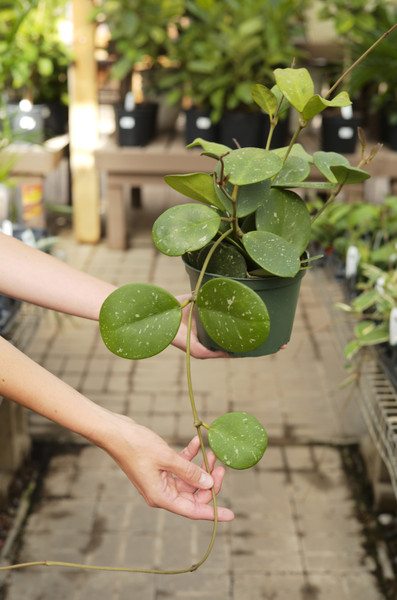Hoya obovata
Posted by Hannah Brand on Jun 6th 2022
June 21, 2022
Hoya obovata
Hey Plant Friends!
This week we are talking about Hoya obovata, one of our all-time favorite indoor plants! We have many hoya collectors among us, and with over 900 unique species, cultivars, and hybrids (that we know of so far), hoyas are beloved for both new and experienced houseplant parents. Hoya belong to the dogbane plant family, Apocynaceae which includes dischidia, milkweed, and plumeria to name just a few. These waxy-leaved plants are native to several countries in Asia including the Philippines, India, Thailand, Malaysia, and Vietnam. Hoya are one of our go-to plants for a burgeoning plant parent, simply for their easy care. Hoya obovata are known for their large, round, deep green, sometimes splashy leaves. Once this plant was extremely hard to find but now you can find them often at Tonkadale, and in multiple sizes.
Let’s talk about care. Hoya obovata needs consistent bright light to really thrive in your home. We recommend the brightest spot in your house, however avoid direct sunlight on the leaves as they might burn. If you can situate your plant in a south facing window your plant will be very happy. When it comes to soil, we recommend a nice chunky arid mix like the Sol Soils Houseplant Mix. Hoya, like most plants will not like to sit in damp soil. Allow them to dry out between watering. You may be watering your Hoya once a week in the summer when bright sunshine and long days are abundant. Dial back on watering in the winter. Allow your hoya to dry out between waterings, then give a good soak.
Hoyas are known for their gorgeous, fragrant, waxy blooms. This is how hoya became to be known commonly as Wax Flower. Fertilize during active growth to promote bud and bloom formation. Use Schultz All Purpose Liquid Plant Food once per month. As always check weekly for pests. Watch out for the usual suspects; mealy bugs and spider mites. Keep a bottle of Bonide’s Insecticidal Soap on hand to treat as needed.
Hoya obovata is available in greenhouse in 4” and 6” pots. If you have additional questions feel free to reach out to us by phone, Instagram, or email us - hello@tonkadale.com

